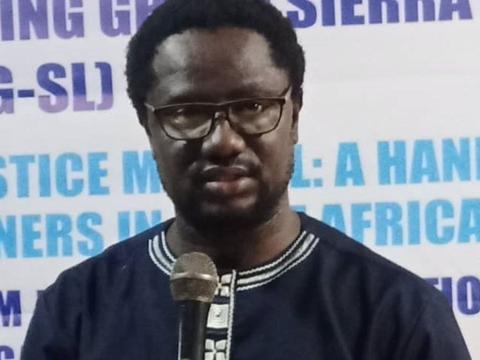By Chernor Alimamy Kamara
The National Coordinator for the Media Reform Coordinating Group (MRCG), Dr. Francis Sowa has urged media practitioners to change the narrative on transitional justice reporting.
He made this statement during the launch of a handbook for media practitioners in West Africa, at the Sierra Leone Association of Journalists (SLAJ) Headquarters in Freetown, an initiative that was funded by the Africa Transitional Justice Legacy Fund (ATJLF).
Dr. Sowa noted that the idea of transitional justice reporting started at the end of the 11 years civil conflict in Sierra Leone during which media practitioners reported stories that basically dealt with the country’s transition from conflict to peace, leaving out the unaddressed issues that caused the war. He said, reporting on transitional justice is mainly done after instances of civil conflicts, war, and human rights abuses.
He pointed out that, transitional justice issues go beyond time or periods of conflict. He said, during the period of peace, there are things that happened that resembled conflict or should remind people about the things that took the nation to conflict.
“As part of this engagement, we have mentees who produced stories in the first grant we got from the ATJLF. What those stories clearly show is that some of the things that took us to war like human rights violations, and abuses are still happening not at a very large scale, but we should be concerned that they are happening in a certain part of the country,’’ said Dr. Sowa.
The MRCG Coordinator went on to say that instances of accessing land in rural communities and issues of corruption that also took the country to war are still evident. He said the recommendations that were made by the Truth and Reconciliation Commission (TRC) are still not equally implemented.
He quoted the former Chairperson of the TRC, Bishop Humper who said: “never again as a country we will not want to strive back into conflict.’’
He added that the manual produced goes beyond Sierra Leone and that it has transitional justice issues that affect other West African countries. He said the manual will also serve as a guide to media practitioners in Africa who are reporting on transitional justice issues.
The MRCG boss added that the manual explains issues of prosecutions and fair trials that are visible in Sierra Leone which he said prompted the existence of the special court.
“We created memorials which led to our work in Mile 91 and the peace museum at Komrabai ferry as part of this project that was facilitated by MRCG and funded by ATJLF,’’ he said.
He believed that anytime a vehicle uses the route of where the peace memorial was built and passengers see that monument, it serves as a reminder that never again should the country go to war. He said those mechanisms created are not only prevalent during the conflict, but noted that those kinds of things will happen even during normal times.
He said the role of MRCG is to engage the media to change the narrative on transitional justice reporting.
One of the mentees of the project, Ishmael Sallieu Koroma noted that it is an eye-opening event for him, saying that he has read about transitional justice in so many books. He added that the ATJLF project deepened his mind in reporting those issues on the findings and recommendations of the TRC report.
He said it was during the process of his reporting that he realized that many of the recommendations put together by the TRC have not been implemented by the government.
“The TRC report recommends for a new constitution and the 30 percent quota for women which are issues that are still bothering our nation,’’ he said.
He reiterated that the lack of justice, corruption, and issues of land are still endemic in Sierra Leone and commended the MRCG and the donors for giving him the opportunity to be part of the project’s mentees.
The MRCG is a coordinating Secretariat for media reform, research, and capacity- building in Sierra Leone. It brings together national media organizations committed to promoting media freedom, digital and online rights, human rights, and governance.
Copyright © 2022 Politico Online (01/08/22)








